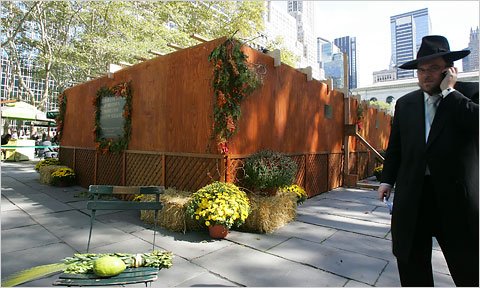|
|

|
|
One Sukkah for All
|
Although hospitality is a mitzvah any day of the year, it takes on special significance during the holiday of Sukkot. When discussing the parameters of a kosher sukkah, our sages rule that there is no limit on how large a sukkah can be or how many people it can contain: “All the Jewish people can sit in one sukkah.” From this statement we derive that the holiday of Sukkot is an opportune time for unity – to get together despite our external differences and sit in one sukkah. The other mitzvah of Sukkot, shaking the lulav and the etrog, likewise emphasizes the concept of unity. Each of the four species represents a different type of Jew, all of which are bound together as one.
According to tradition, on each night of Sukkot our sukkah is graced with a different guest. Our ancestors come calling to join the holiday celebration. The seven guests, or ushpizin, as they’re known in Aramaic, are Abraham, Isaac, Jacob, Moses, Aaron, Joseph, and David.
In a broader sense, all of us are considered as guests eating at the table of our Father in Heaven. Our sages say that our saying Grace after meals is like a guest thanking the host for the food. Although the normal order of things is that the son serves the father, in this case the father serves His children, and we thank Him and thus draw down His blessings into all areas of our lives.
Furthermore, we are in the world as guests, rather than as permanent residents. Each of us has within us an actual part of G-d. Our purpose in descending to this world is to reveal the G-dliness in it; both by drawing G-d down into the world, and by elevating the world and making it holy.
The theme of hospitality is especially emphasized on the first night of Sukkot, when the ushpiza (guest) is Abraham, who was renowned for hosting guests. He would graciously serve all wayfarers, and at the end of the meal, when they offered him compensation, he would instead direct them to thank G-d. In this way he made the name of G-d known far and wide. He used worldly matters to bring his guests closer to G-d.
When we have a guest, we strive to honor them and make them feel at home. When our guest is Abraham, the greatest honor we can show him is by following in his footsteps and inviting guests of our own. Not only this, but we can also emulate Abraham’s strength in disseminating the name of G-d throughout the world.
In the Chassidic tradition, we have not only the classical guests of the Zohar, but also the Chassidic Ushpizin – the successive Rebbes in the Chassidic and Chabad dynasty, beginning with the Baal Shem Tov. The Baal Shem Tov was known as a miracle worker, and his presence on the first night of Sukkot will ensure that our efforts to increase in hospitality play out in a supernatural way. In this way, our Sukkot celebrations will segue directly to the true and complete Redemption, when G-d will “erect for us the fallen sukkah of David,” with the rebuilding of the third Holy Temple, immediately.
|
|
|
|
|

